August 2003
reference
2 August 2003, around 8.06.
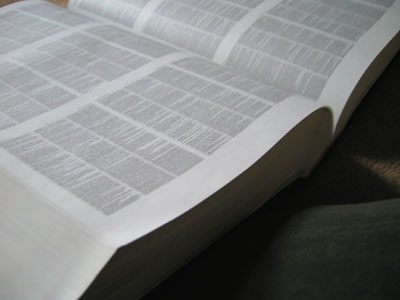
Compact OED
To make decisions to avoid regret. The origins of regret: ‘The ultimate origin is uncertain’ (OED, s.v. regret) – ineluctable.
diction
4 August 2003, around 8.04.
Wherefore, I beckoned to Gioffredo to take the ankles: but I myself took the hollow armpits; and terribly the head waggled between. In this manner we flung the dead slave from the balcony: but, after we had heard the splash of his fall in Tiber, we returned, expecting new events.
‘Terribly the head waggled between.’ Waggled? Waggled? A trifle bathetic, don’t you think?
I suppose I shouldn’t complain, though; I mean, it’s not like he compared Herodotus to a desiccated lemon or a primary source to minestrone soup — unlike one scholar (in a published article) whose name I shan’t mention. (Not that said scholar seems to stand much on his dignity…)
Shoot the messenger
5 August 2003, around 8.07.

These characters, which now are wet and glossy, will become invisible when they are dried, being of the same colour as the substance on which We write. Such is the nature of this magic, that neither sweat nor water will affect it.
poena sine fine
6 August 2003, around 8.05.
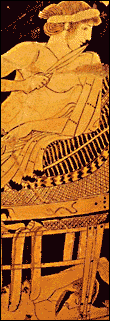
After reading Donna Wilson’s Ransom, Revenge, and Heroic Identity in the ‘Iliad’ (based on the dissertation she prepared for the University of Texas, Austin) the largest question I have for the author concerns her relationship with her father. Her discussion of the character of reparation in the Iliad emphasizes the role of the father in ransoming captured children to the complete exclusion of other members of the family (I’m thinking primarily of brothers, but one might include uncles, cousins, etc.).1 Nor does she articulate the father’s role as head of the family, rather than referring to him in the emotionally more resonant role of patêr qua daddy.2 Yet I cannot think Priam’s paternal sentiments were foremost in his mind when he was paying the ransom for his idiot son Lycaon (nêpie, Achilles says, 21.99) – or, to be more precise, paying back the xeinos who had bought the boy from Achilles (21.34ff.). It is worth noting, too, that Wilson makes perhaps too nice a distinction between ransom (apoina) and supplication (hikesia) – to supplicate someone is obviously not the same thing as paying a ransom, but the promise of ransom (or some other reward – prayers, dedications, etc.) is an essential component of hikesia and to say they are not related (as Wilson does, with the crisp endnote ‘contra Thornton (1984)’) is at the very least obtuse.3
This is, however, merely nitpicking – the first chapter on the distinction between poinê (retribution) and apoina (reparation/ransom) is wonderfully clear and thoughtfully argued – so well argued, in fact, that the remaining chapters seem almost redundant, though they contain thoughtful readings of bks. 1, 9, & 24.4 (cf. BMCR review.)
Finally, may I request a moratorium on the word ‘poetics’ – be they cultural, structural, or psychobabblistic – please? It is at once an annoying and imprecise term – hardly the qualities one should take pains to nurture.
- E.g. Helen expects her brothers Castor and Pollux to fight with the Argives to take her back from Troy (bk. 3); Andromache includes the death of her brothers when detailing her utter dependence on Hector (bk. 6). [↩]
- Which works for Priam in bk. XXIV, by when made to be a ‘theme’ seems strained to me. [↩]
- Wilkins is differing from Agathe Thornton’s Homer’s Iliad: its Composition and the Motif of Supplication. Hypomnemata 81. Göttingen, 1984; however, Wilkins goes so far as to elide the context in which Lycaon offers ransom, viz., during a formal supplication, which suggests that she has not sufficiently examined the connection. [↩]
- Incidentally, Wilkins makes a great to-do about the limitations of poinê as opposed to the vaunted τ’ ἀπερείσι’ ἄποινα (boundless ransom) without considering the metrical limitations; ἀπερεισίην ποινήν (· · — · — – –) cannot scan in dactylic hexameter (juvenile argument, but there it is). One has only to think of the very deus ex machina end to the cycle of poinê in Aeschylus’s Eumenides to sense that Greeks (at least in the heroic model) had a very hazy sense of poinês limits; still, Wilkins has confined herself to Homer, and so to Homer I shall defer. [↩]
logorrhea
9 August 2003, around 8.10.
The Most Illustrious Purpled Person will choose to hear the rogue’s confession of his crime.
It is a hot, and it is summer, and there is soymilk and milk made of almonds, and there is also water purchased in blue plastic containers, and I too sometimes think there should be ‘Society of Deprecated Punctuation’ (though I would not admit to thinking that for any great length of time), and I simply cannot stop reading this, a state of affairs which makes it somewhat less surprising that it took me five hours to read Burkert’s 129-page The Orientalizing Revolution (which shouldn’t take, all told, more than three hours, though usually one would divide it over three days, that being the number of chapters), which claims it’s about Near Eastern influence on Greek culture in the early archaic age even though most of the evidence and influences are fifth century or later, which is a skewed definition of ‘the early archaic age’ it seems to me. But it is summer.
of doubtful origin
10 August 2003, around 8.21.
The news which We desire are not of that nasty species.
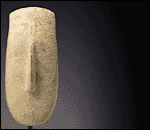 The hipster (who aspires to archeologist street-cred because she worked one summer at Petra) was talking about a scandal involving the Met Museum, a fracas she had heard about while working as a law clerk in New York. An eccentric gentleman had, it seems, written a book pointing out that many of the ancient artifacts in said museum ‘have no provenience’ and that the trustees, curators, & co. were, if not actually hushing the matter up, at least not proclaiming this ‘truth’ in large letters on billboards for the edification of the public.1 Museological shenanigans are nothing new (cf. Elgin Marbles), but the word provenience, which I had never heard before, gave me pause: pro-VEE-nyehns? what about provenance (PROH-veh-nehns)?
The hipster (who aspires to archeologist street-cred because she worked one summer at Petra) was talking about a scandal involving the Met Museum, a fracas she had heard about while working as a law clerk in New York. An eccentric gentleman had, it seems, written a book pointing out that many of the ancient artifacts in said museum ‘have no provenience’ and that the trustees, curators, & co. were, if not actually hushing the matter up, at least not proclaiming this ‘truth’ in large letters on billboards for the edification of the public.1 Museological shenanigans are nothing new (cf. Elgin Marbles), but the word provenience, which I had never heard before, gave me pause: pro-VEE-nyehns? what about provenance (PROH-veh-nehns)?
That I am frequently ignorant and often mistaken, I willingly acknowledge; in this instance, awed perhaps by her sartorial excesses (which, as we know, infallibly signify correct English usage), I assumed – with true faith in my capacity for folly – that provenience was a highly specialized museo-/archeo-logical term, similar but not identical to the more familiar provenance. Just to be sure, though, I referred to my good friend the OED, which said:
provenience, n.
= provenance. Now chiefly U.S. (and to some extent Canad.).
[L. provenient-em, pr. pple. of provenire to provene: see -ence. Preferred to provenance by those who object to the French form of the latter: cf. convenance, convenience.]
I will eschew jokes about freedom-findsites and tell you plainly this entry did not content me. Nor, indeed, did that of the American Heritage Dictionary4 & M-W: ‘Alteration of provenance.’ So I did what any self-respecting idiot would do: I checked usage.
As per Google: Provenience – 26,000 results, the most amusing of which was:
…despite his lack of academic connections and his provenience in the often ideological left…
Other results included:
- ‘…it will not be easy to receive an answer to the provenience of all the vessels…’ Qumran Archeometry
- monuments of unknown provenience at the Mayan Epigraphy Project
- a bibliography for Provenience Studies and Cypriote Sculpture Found Abroad
- The Provenience, Typology and Chronology of Eastern Terra Sigillata (Hebrew University of Jerusalem – Institute of Archaeology, 1983)
- One more article at the NY Times: ‘New Answers to an Old Question: Who Got Here First?‘ (John Noble Wilford, 9 November 1999)
Provenance returned 704,000 results, none of which made me laugh.
Lack of amusement aside, these results seem to confirm two suspicions: 1) most people say provenance – provenience is a word used by acheologists and their ilk; 2) Lewis Lapham likes to make snide jokes his audience really can’t be expected to find amusing. Speaking of Lewis Lapham, I decided to search magazines and, since Harper’s doesn’t put anything online except the index, I searched the The Atlantic: provenience — 0, provenance — 31. Finally, there was this helpful on an archaeology info page:2
Provenience is another word which has a slightly different meaning when used archaeologically. The dictionary defines provenience (a variant of the more common provenance) as ‘origin’ or ‘derivation.’ In the art world, provenance means the history of an object, where it came from and who owned it. It is sometimes used this way in archaeology as well, when referring loosely to the origin of an object. More technically, in archaeology the term refers to the actual position of the object in three dimensions. Thus, an object’s provenience can be stated as being 30m north, 22m east, and 3.5m down from an arbitrary fixed point on the site (called the datum point).
Venturing, then, into the depths of archeological jargon, I searched the relevant journals with JSTOR where, not surprising, the results were much closer: provenience — 1252, provenance — 1481, provenance+provenience — 112. Interestingly, the two earliest entries give provenance in italics (that is, as a French word; see JHS No. 2 (1881): 100, & No. 3 (1882): 285). The first JSTOR entry for ‘provenience’ is in an article written by the English archeologist Percy Gardner, in his article ‘A Sepulchral Relief from Tarentum’ (JHS 5 (1884): 112):
…as to their provenience, it seems to be established that in some cases at all events they come from cemetaries…
Only the year before, Gardner had used provenance (without italics) in his article ‘A Statuette of Eros’ (JHS 4 (1883): 266 — 274):
…on grounds of style this provenance would seem scarcely probable…
I would guess that Gardner, in using provenience, was trying separate the origin of the object from its art-historical provenance and, precisely because the word provenance has cultural baggage, turned to the relative neologism, provenience. Around this time – viz., when I should be drawing conclusions – I became a bit bored with the entire enquiry, and though hipsters exist solely to be mocked, there is only so much effort I wish to expend in the process. Besides, it might seem as though I were trying to score points off the young woman’s false diction, which isn’t the case at all. If she had been nit-pickingly accurate in all other details, it would make sense to fault her for saying provenience – which taken as narrowly as possible should perhaps just refer to the findspot – for very few items spring miraculously out of the ether: they have a provenience, even if it is unknown. That items in the Met should be without a clear history of ownership and origin is, of course, deplorable;3 but it is not much of a surprise and I find it difficult to imagine why anyone would make a fuss about it. Scholars will argue about the dates of objects, about the craftsman who made it, about its role in history, which suggests that the primary characteristic of such facts is their mutability. Solipsism is, however, the refuge of the uninspired and, having found my haven, I will at last be quiet.
- A learned associate has pointed me to an article that mentions Oscar Muscarella’s The Lie Made Great, which is probably the book in question; of all this, however, I remain as ignorant as ignorant can be. [↩]
- [Link rotted]. [↩]
- For an entire museum crammed with items of unknown provenance (and provenience), one might refer to the Gouldandris Museum of Cycladic Art… [↩]
afoot
12 August 2003, around 6.35.

The night of the hottest day ever.
Citation (11)
16 August 2003, around 2.08.
Since there are more Fools in the World than Wise Men, and even among those who pass for Wise, that is, who have Abilities to be truly so, too many abuse and warp their Understanding to petty and evil Designs, and to such Trials and Artifices as appear the readiest way to attain them. Since Riches and Power are what Men covet, supposing these can procure them all they wish; Hopes to gain more, or at least to secure what one has, will always be a handle by which Human Nature may be mov’d, and carry’d about as the cunning Manager pleases.
alma mater
18 August 2003, around 20.10.
Dogs aren’t allowed on the trail without a leash, both to prevent them from harassing other hikers and to keep the dogs themselves out of trouble. In places the sound of the river rises up the gravel slope, and thirsty dogs rush down for a drink and cannot reascend; should the owner go down to fetch the dog, he or she will be trapped as well. The hiker, unlike the dog, has brought a mobile phone for the ultimate wilderness experience: chatting with search and rescue.
An outdoorsman was lost in the woods sometime this last winter, and the forest service couldn’t find him. Once the weather cleared up, they started searching again and found some clothes and bits of bone—not the right man, though.
On clear nights, one can always see the stars.
heptaphyllon
20 August 2003, around 17.08.
There is a book on vegetables in literature – rather, on the literary life of vegetables or vegetables as literary figures. This shouldn’t come as a surprise to anybody, especially not to those who are aware that someone has written about the importance of spiderwebs in Middlemarch (one imagines the scholar thanking her spouse in the preface, perhaps for dusting). There is not, to my knowledge, a book about the importance of cabbages in world literature, and this is a fault which should be remedied. I haven’t the time to compose such a scintillating opus, and so I shall briefly make a case for its importance.
* * *
Who the hell am I kidding? I hate cabbages – even if they were mentioned by the sixth-century iambic poet Hipponax (who is, incidentally, the earliest Greek source on scapegoating), by Juvenal, by Rabelais, by Woolf and by Forster, and by others I have in the meantime forgotten, always in terms of the mundane, the ordinary, the antithesis of the divine – which is, one must admit, a pretty accurate description of a cabbage.
inquiry (1)
22 August 2003, around 0.55.
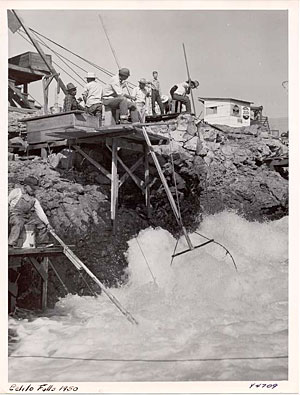
Indigenous people fishing at Celilo Falls
on the Columbia River, 1950
(dammed 1957).
ODOT Historical Travel Photos
inquiry (2)
22 August 2003, around 19.27.

William J. Faubion House
Zigzag, OR (built ca. 1908)
[June 2002]
inquiry (3)
23 August 2003, around 15.44.
It is a long story and a sad story, not yet complete and not entirely knowable – mainly about the past and how to deal with it. For lack of evidence, I’ll skip the beginning, though the middle is hearsay and the end has not yet arrived. Starting, then, in media res: the old man died sometime around 1944 – perhaps as early as 1938, perhaps as late as 1946, I haven’t yet checked. The old man was the original homesteader, government patent, freshly stolen from the salmon-fishing natives in nineteen-aught-seven. He built the house sometime around 1908, if one can believe the crumpled newspapers (Oakland Tribune, June 16, 1908 & December (something) of the same year) used for insulation. It is said he kept a hotel in addition to starting a post-office, but the sources decline to corroborate that fact. In any case, he died, and the property was sold to a gentleman whom I (for the sake of convenience) shall call Gustav. Gustav was not, so far as I know, related to the family, though the old man had three daughters and two sons; of these, only one daughter takes a stand in the historical records, as the firm wife of one of the older local families (they came west in the 1860s) a character, a shop-keeper, and prudent investor in golf-courses.
Returning, however, to Gustav – he kept the house for only a short time, selling it in 1946 to a fellow called Ed, who planned to fix the place up. Whether Ed meant to modernize the old house or refurbish it is unclear, but he dug a large pit under it and put up drywall in places drywall had little business being. He claimed that his wife was related to the old man (‘a distant cousin’) and he was keeping the place in the family, but this may be wishful thinking. He also found time to build a ramshackle folly of a house from the odds and ends of wood and stone he happened to have lying about. In the fullness of time (as the saying goes) he also had two sons; rather, his wife bore one son, Gabriel, and they adopted another, whom I’ll call Joe. Both boys were indulged by their father, who was as lenient as he was temperamental. Leniency and rages do not the best of children breed, and if not whip-smart, the two boys grew at least to be sharper than a serpent’s tooth.
Sometime in the 1980s the old house was placed on the register of historic homes—a process as easy as not answering a letter: Ed, we want to place the house on the register of historic homes, unless we hear from you, we shall do so, Yours Sincerely, Oregon Historical Whatsit. This despite the destruction of the original stone fireplaces and retaining walls, despite the lack of interior walls (except for the drywall installed by Ed) and the absence of stairs and numerous window panes. Now the story turns: Ed’s wife died in the early 90s and Ed signed over his power of attorney to his eldest son, Gabriel, who by then lived in a nearby town. Why Ed did so boggles the mind—perhaps he thought this would cause Gabriel to manage the upkeep of the place and take care of his old dad. Gabriel did nothing of the sort, but logged the property to fund his own private ventures, concerning the nature of which I am thankfully ignorant. Whether it was the death of his wife, or the logging of the property, or the decrepitude of everything around him, Ed hanged himself in 1997 and left the property to Joe, who mortgaged it within the month.
Citation (12)
26 August 2003, around 17.42.
Even if we venture bravely to paint like them, it’ll amount to the same thing, In the end, our methods will die out, our colors will fade. No one will care about our books and our paintings, and those who do express interest with a sneer, with no understanding whatsoever, why there’s no perspective—or else they won’t be able to find the manuscripts at all. Indifference, time, and disaster will destroy our art. The Arabian glue used in the bindings contains fish, honey and bone, and the pages are sized and polished with a finish made from egg white and starch. Greedy, shameless mice will nibble these pages away; termites, worms and a thousand varieties of insect will gnaw our manuscripts out of existence. Bindings will fall apart and pages will drop out. Women lighting their stoves, thieves, indifferent servants and children will thoughtlessly tear out the pages and pictures. Child princes will scrawl over the illustrations with toy pens. They’ll blacken people’s eyes, wipe their runny noses on the pages, doodle in the margins with black ink…
inquiry (4)
30 August 2003, around 4.18.
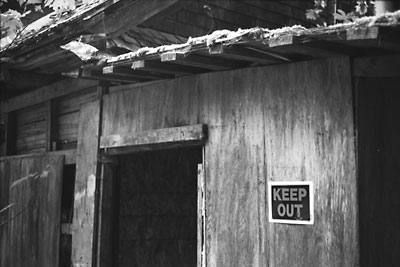
William J. Faubion House
Zigzag, OR (built ca. 1908)
[August 2003]
inquiry (5)
30 August 2003, around 21.15.
Game was plentiful and at times a drove of elk could be seen on Hunchback mountain which at that time was bare of timber. Food consisted of fresh meat they could kill, beans, bacon, potatoes and dried fruit.
Together they cut all trees in the valley, mostly alder. One year late in August, they set fire to the slashing. It was bone dry and burned clean. That fall they sowed timothy seed in the burned over area and in the spring it grew head high. Now they had feed for their cattle.
About 1890 they built a new house. This attracted summer vacationers, who came by the day. Then came the Indians on their ponies to pick huckleberries and to fish. Salmon were so plentiful, Indians rode their ponies into the river and speared the fish. They built dryers along the river and flies accumulated by the millions. Some stench! It became unbearable and Uncle Sam Welch drove them off his land. The Indians moved down the river where Arrah Wanna is now. Until 1920 the Indians came down Huckleberry Mountain with berries for sale.
